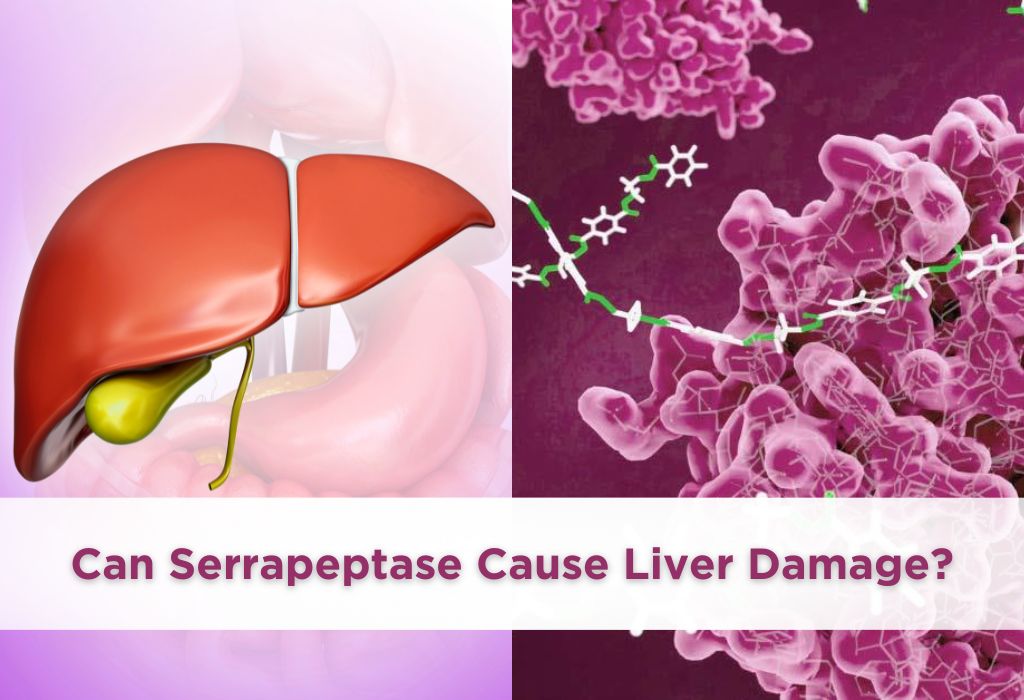
Can Serrapeptase Cause Liver Damage?
Speaking of Serrapeptase, a widely known natural protein-digesting enzyme, many questions are often raised about its impact on overall health.
One of them is "Can Serrapeptase Cause Liver Damage?" to which the answer in most studies is "no"; however, this is not yet entirely certain. Follow the specific answer in the article below.
Before exploring further, please read the disclaimer located at the end of this webpage.
Key Takeaways
- The potential harm of Serrapeptase to the liver remains uncertain.
- Numerous studies have proven Serrapeptase's ability to remove biofilm, supporting the liver's function of detoxifying blood. Yet, studies indicate the enzyme's contribution to granulomatous hepatitis.
- The effective dosage of Serrapeptase consumption is 10 mg daily, taken on an empty stomach or 2 hours after eating.
- Serrapeptase could cause side effects such as vomiting, nausea, redness, rash, muscle pain, joint pain, etc. if used incorrectly and in overdose.
Can Serrapeptase Cause Liver Damage?

The potential of Serrapeptase to cause liver damage is not definitively known. A documented case reported symptoms of granulomatous hepatitis, a type of liver inflammation, after the use of Serrapeptase [1]. This condition manifested as a widespread rash and liver dysfunction, making it the first reported case linking Serrapeptase to granulomatous hepatitis.
While Serrapeptase is often highlighted for its anti-oxidant and pain-relief benefits, it's crucial to be aware of possible side effects. Reported adverse effects include stomach pain, diarrhea, joint and muscle pain, skin reactions, and cough.
Moreover, Serrapeptase can interfere with blood clotting mechanisms, posing a risk for individuals with clotting disorders or those taking anticoagulant medications such as warfarin or aspirin. Long-term use might also put stress on the liver, particularly in individuals with pre-existing conditions such as cirrhosis or fatty liver disease.
As a enzyme supplement, Serrapeptase is not regulated by the U.S. Food and Drug Administration (FDA) for safety or efficacy, meaning it does not adhere to the same stringent standards as prescription drugs. Therefore, it is imperative to approach Serrapeptase with caution and consult with a healthcare professional before beginning its use, especially if there are any underlying health conditions.
Certain groups should avoid Serrapeptase unless advised by a doctor. These include pregnant or breastfeeding women, individuals on blood thinners, or those with liver conditions like hepatitis or cirrhosis. The enzyme’s impact on blood clotting and liver function could be particularly concerning for these groups, potentially exacerbating their conditions.
How Does Serrapeptase Impact the Liver? What Science Says
Serrapeptase, a proteolytic enzyme derived from the bacterium Serratia, is found in the intestines of silkworms. This enzyme helps silkworms digest their cocoons without damaging sensitive tissues, a property that may have implications for human health, particularly liver health.
What is Biofilm?
Biofilm refers to a community of bacteria that attach to complex surfaces and are interconnected by a self-produced polymer matrix [3]. Biofilms can be either beneficial or harmful. Harmful bacterial biofilms, for example, can cause chronic infections and act as shelters for viruses, bacteria, fungi, and heavy metals in the intestine [4]. Serrapeptase helps break down these harmful biofilms, which can be beneficial for overall health, including liver function.
Impact on Liver Health
A 2024 study demonstrated that Serrapeptase and other proteolytic enzymes like Bacillus subtilis monoculture enzyme can stimulate the growth of beneficial bacteria in broilers, which in turn improves antibody efficacy and liver function tests [5]. This is because the enzyme’s antigenic fragments can cross the intestinal epithelial barrier, influencing the immune response and improving liver health.
Anti-inflammatory and Detoxification Properties
Serrapeptase is known for its anti-edema effects in some tissues [6]. It enhances the effectiveness of antibiotics at infection sites, reduces liver inflammation, and balances liver enzyme levels. Moreover, by breaking down excess fibrin in the blood, Serrapeptase supports improved blood circulation, promotes liver detoxification, and prevents sediment accumulation in the liver. This helps maintain liver function by ensuring it has enough space to operate effectively and the necessary enzymes to remove waste from the body [7].
Reducing Fibrosis
Research has also shown that Serrapeptase can help reduce fibrosis in the body. When the liver is damaged, it tends to replace healthy cells with fibrous tissue, leading to scarring. Serrapeptase can minimize this fibrosis, aiding in the removal of scar tissue and supporting liver health [2].
You may be interested: Does Serrapeptase Cause Hair Loss?
Other Serrapeptase Side Effects You Need to Know
Serrapeptase is safe when used continuously in short-term clinical trials. However, its safety is not guaranteed over a long period. Drug interactions, misuse of dosage, Serrapeptase can cause some side effects such as:
- Nausea
- Vomiting
- Abdominal pain
- Loss of appetite
- Blood hemorrhage (rare)
- Diarrhea
- Skin irritation or inflammation
- Cough
- Blood clotting disorders
- Muscle joint pain
- Red rash, redness
- Stevens-Johnson syndrome
- Eosinophilic pneumonia
- Bullous pemphigoid
Be cautious when consuming any dietary supplements. Especially if the body shows the above symptoms after consuming Serrapeptase, stop using it and immediately visit a doctor or reputable expert for quick recovery.
How to Use Serrapeptase Safely and Effectively?
The effective dosage of Serrapeptase is 10 mg (equivalent to 20,000 enzyme activity units), which should be taken on an empty stomach, either 30 minutes before a meal or 2 hours after eating.
This dosage is based on various studies. For example, a study by Yamaguchi in 2009 found that the minimum effective dosage of Serrapeptase is between 5 and 10 mg per day (equivalent to 10,000-20,000 enzyme activity units) [8].
Another study conducted by Health Canada in 2018 showed that the maximum safe oral dosage for humans is 60 mg per day (equivalent to 120,000 enzyme activity units) [9].
For specific medical conditions, such as post-surgery recovery, it is recommended to take 10 mg of Serrapeptase three times daily to help reduce swelling and pain [10]. For patients with ENT (ear, nose, and throat) disorders or chronic bronchitis, the same dosage of 10 mg, three times a day, is advised for 1-2 weeks [11].
Conclusion
In summary, the most accurate answer to the question "Can Serrapeptase Cause Liver Damage?" depends on the health condition, the dosage used, and its interaction with the drugs you use. Serrapeptase has been studied for many effects on the body, especially its antioxidant properties; however, regarding liver function, whether this type of enzyme causes harm or support is still a conservation.
Related article:
- Benefits Of Serrapeptase For Heart Disease & Arterial Plaque
- Can You Take Serrapeptase With Coffee?
- Can You Take Serrapeptase And NAC Together?
References
- [1] Dohmen, K. “Granulomatous Hepatitis Induced by Saridon and Serrapeptase.” Hepatology Research, vol. 11, no. 2, June 1998, pp. 133–137, https://doi.org/10.1016/s1386-6346(98)00016-3. Accessed 9 Feb. 2023.
- [2] websites. “Serrapeptase (New).” Agri-Growth International Inc., 19 July 2018, www.agriorganics.com/serrapeptase-new/. Accessed 11 May 2024.
- [3] Muhammad, Musa Hassan. "Beyond Risk: Bacterial Biofilms and Their Regulating Approaches." Frontiersin, 21 May 2020, www.frontiersin.org/journals/microbiology/articles/10.3389/fmicb.2020.00928/full. Accessed 11 May 2024.
- [4] Yan, Jing , and Bonnie L. Bassler. "Surviving as a Community: Antibiotic Tolerance and Persistence in Bacterial Biofilms." Cell Host & Microbe Minireview, 10 July 2019, www.cell.com/cell-host-microbe/pdf/S1931-3128(19)30291-4.pdf. Accessed 11 May 2024.
- [5] Mushtaq, Muhammad, et al. "Different Levels of Single-Strain Probiotic (Bacillus Subtilis) with Proteolytic Enzyme (Serratiopeptidase) Can Be Used as an Alternative to Antibiotic Growth Promoters in Broiler." Poultry Science, vol. 103, no. 3, 1 Mar. 2024, p. 103400, www.sciencedirect.com/science/article/pii/S0032579123009203, https://doi.org/10.1016/j.psj.2023.103400. Accessed 11 May 2024.
- [6] H.S., Abd El-Hamid, and Ahmed H.A. "Impact of Serratiopeptidase Treatment on Performance and Health Parameters in Broiler Chickens." Researchgate, May 2014, www.researchgate.net/profile/Hamada-Ahmed-3/publication/263170976_Impact_of_Serratiopeptidase_Treatment_on_Performance_and_Health_Parameters_in_Broiler_Chickens/links/02e7e53a1ce9d67bfd000000/Impact-of-Serratiopeptidase-Treatment-on-Performance-and-Health-Parameters-in-Broiler-Chickens.pdf. Accessed 11 May 2024.
- [7] "Enhance Blood Cleansing with Systemic Enzymes." RidgeCrest Herbals, 26 Apr. 2023, rcherbals.com/blogs/herb-nerds/enhance-blood-cleansing-with-systemic-enzymes. Accessed 11 May 2024.
- [8] Yamaguchi T. Perspectives on enzyme products in the Japanese Pharmacopoeia. Presented at: USP Enzyme Workshop Meeting; July 8, 2009; Rockville, MD.
- [9] Government of Canada, Health Canada. "Natural Health Products Ingredients Database." Webprod.hc-Sc.gc.ca, 26 July 2004, webprod.hc-sc.gc.ca/nhpid-bdipsn/atReq.do?atid=serrapeptase&lang=eng. Accessed 11 May 2024.
- [10] Tachibana M, Mizukoshi O, Harada Y, Kawamoto K, Nakai Y. A multi-centre, double-blind study of serrapeptase versus placebo in post-antrectomy buccal swelling. Pharmacotherapeutic. 1984;3(8):526-530.6366808
- [11] Mazzone A, Catalani M, Costanzo M, et al. Evaluation of Serratia peptidase in acute or chronic inflammation of otorhinolaryngology pathology: a multicentre, double-blind, randomized trial versus placebo. J Int Med Res. 1990;18(5):379-388.2257960
Author

Product Disclaimer
The dietary supplement products mentioned on this website are formulated based on scientific research and adhere to FDA guidelines for dietary supplements. However, the content of the articles has not been evaluated by the Food and Drug Administration (FDA) and is not intended to promote or endorse any specific product. Any products sold on this website are not intended to diagnose, treat, cure, or prevent any disease.
Opinions and Endorsements
Any claims, statements, or opinions expressed in the articles are those of the author(s) and do not necessarily reflect the views or opinions of the manufacturers of the dietary supplement products. The products sold on this website are separate from the content of the articles and are not directly endorsed or associated with the information presented here.
Liability Disclaimer
The author(s) of the articles, website, and manufacturers of the dietary supplement products do not assume any liability for any potential consequences arising from the use of the information provided in the articles. It is recommended that individuals consult with a qualified healthcare professional before making any dietary or lifestyle changes, including the use of dietary supplements.
Product Usage
Please refer to the product labels and packaging for specific usage instructions and guidelines for the dietary supplement products sold on this website.
Customer Support
For any concerns or questions regarding the dietary supplement products, please contact our customer support team, who will be more than happy to assist you.





Leave a Comment
Be the first to comment.
What do you think?